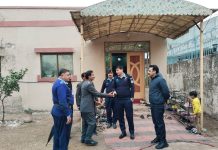By Minahil Makhdoom
ISLAMABAD: The internationally appraised Ehsaas program has touched the lives of half the country’s population amid the COVID-19 crises in the country during the year 2020 and continues to empower the weakest segments of society through its multi-faceted initiatives.
According to the annual report disclosed by the Poverty Alleviation and Social Protection Division (PASSD) headed by Special Assistant to the Prime Minister on Social Protection and Poverty Alleviation, Dr. Sania Nishtar , many transformative initiatives and policy reforms have effectively been implemented nationwide since the launch of Ehsaas as an umbrella programme on March 27, 2019 by the Prime Minister Imran Khan.
Some of the Ehsaas’ early wins across various sectors include Kafaalat, Emergency Cash, Undergraduate Scholarship, Nashonuma, Langars, Interest Free Loans, Amdan and several others. The government has launched the Ehsaas Emergency Cash programme that has been widely acknowledged and showcased worldwide for mitigating the pandemic’s socioeconomic damage. The programme was rolled out within ten days after lockdown began and delivered one-time cash grants to 14.8 million deserving households (100 million people) with disbursements reaching Rs. 179 billion.
In 2020, Ehsaas Undergraduate Scholarships granted 50,762 need cum merit-based scholarships to undergraduate students from the low-income backgrounds; Ehsaas interest free loans supported more than 1 million borrowers (46% women) through loans worth Rs. 37 billion to run small enterprises, Ehsaas Amdan transferred small income-generating assets worth Rs. 2 billion to 34,812 deserving households to graduate them out of poverty and Ehsaas Nashonuma opened 29 centers in eight districts of the country to tackle stunting among pregnant and lactating mothers, and children under the age of two years through a mix of conditional cash transfers and specialized nutritious food. By the end of Feb 2021, 19 more centers are opening in six districts.
The Ehsaas Kafaalat program, in efforts to contribute to the socio-economic mainstreaming of the poorest, provided unconditional cash transfers along with saving bank accounts for millions of deserving households. As part of the recent enhancement through PM’s approval, the number of Kafaalat recipients has been increased from currently 4.6 to 7 million; a new Ehsaas Kafaalat for Special Persons Policy has also been announced bringing 2 million deserving families with a disabled person into the fold of Kafaalat.
Consolidating high-end technology, widespread Ehsaas Kafaalat reforms have also been introduced to ensure integrity specifically payment through bank branches, device restrictions and many other transparency and safety protocols and measures. To enroll deserving households in Ehsaas, the digitally enabled Ehsaas survey is ongoing in various districts across the country. The game changing survey is currently 56% complete in the field and is expected to be concluded before June 2021 nationwide. Once the survey nears completion in each district, Ehsaas registration desks are also opened at tehsil levels to facilitate self-registration of left out deserving households.
Among other initiatives, Waseela e Taleem Digital, an education conditional cash transfer programme has massively been reformed and upscaled through end-to-end digitization, cost effective changes in institutional infrastructure, new stipend policy and nationwide expansion to all districts. Also, under ‘Mazdoor ka Ehsaas, 16 Ehsaas Langars have been opened so far in all provinces and the federal capital through the public-private partnership feeding 600-1,000 daily wage earners everyday and work on the remaining has been fast-tracked.
Furthermore, drawing on IT proficiencies, the living standards of all Panagahs in Islamabad have been restructured with enhanced infrastructure and standardized capacity for food catering and living. By the end of 2020, the pilot rollout of the Ehsaas Tahafuz, Pakistan’s first shock-oriented precision safety net, has just commenced to protect the vulnerable against catastrophic health expenditures. Also, the soon-to-be-launched Ehsaas One Window initiative will assist beneficiaries through a single window solution and will avoid fragmentation. The first prototype physical centre will open in Islamabad by March 2021.
Sitting under the umbrella of Ehsaas, there are more than 50 Dar-ul-Ehsaas Centres in the country and each centre provides quality care and education to hundred deserving children. Likewise, through 156 Women Empowerment Centers, skills training courses are imparted to deserving yet talented girls and women. More than 200 girls are trained annually in each centre.
“On the whole, central to the success of Ehsaas is the stringent adherence to ‘Ehsaas Governance and Integrity Policy that is binding on the executing agencies of Ehsaas. The deep-rooted reforms brought under the governance policy confirm our resolve to tackle corruption, collusion and leakage. In a similar vein, it has paved the way for Ehsaas to deliver with better integrity and transparency†, SAPM Dr. Sania Nishtar commented.
For instance, BISP that is one of the 34 executing agencies of Ehsaas has undergone a multi-pronged process of integrity reforms under Ehsaas governance and integrity policy to transform and expand its safety net operations particularly board policies, IT security systems, payment and financial regulations, shift to accrual accounting system and the use of data analytics, biometric payment system, desk-based self-registration system, the demand side SMS and web service.
Hinged on more than 140 initiatives and policy areas, the Ehsaas is aimed at reducing inequality and alleviating poverty through a multi-sectoral and multi-stakeholder approach.






